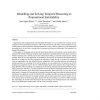889 search results - page 159 / 178 » Observational Learning in Random Networks |
127
click to vote
AI
2008
Springer
15 years 2 months ago
2008
Springer
Representing and reasoning about time dependent information is a key research issue in many areas of computer science and artificial intelligence. One of the best known and widely...
133
click to vote
TON
2010
14 years 9 months ago
2010
Distributed opportunistic scheduling (DOS) is studied for wireless ad-hoc networks in which many links contend for the channel using random access before data transmissions. Simpl...
103
click to vote
PERCOM
2009
ACM
16 years 3 months ago
2009
ACM
This paper examines the recovery of user context in indoor environments with existing wireless infrastructures to enable assistive systems. We present a novel approach to the extra...
143
Voted
PERCOM
2005
ACM
16 years 2 months ago
2005
ACM
In this paper, we present a novel method to adapt the temporal radio maps for indoor location determination by offsetting the variational environmental factors using data mining t...
108
Voted
IJCNN
2007
IEEE
15 years 8 months ago
2007
IEEE
— In the process of learning a pattern I, the Fuzzy ARTMAP algorithm templates (i.e., the weight vectors corresponding to nodes of its category representation layer) compete for ...

